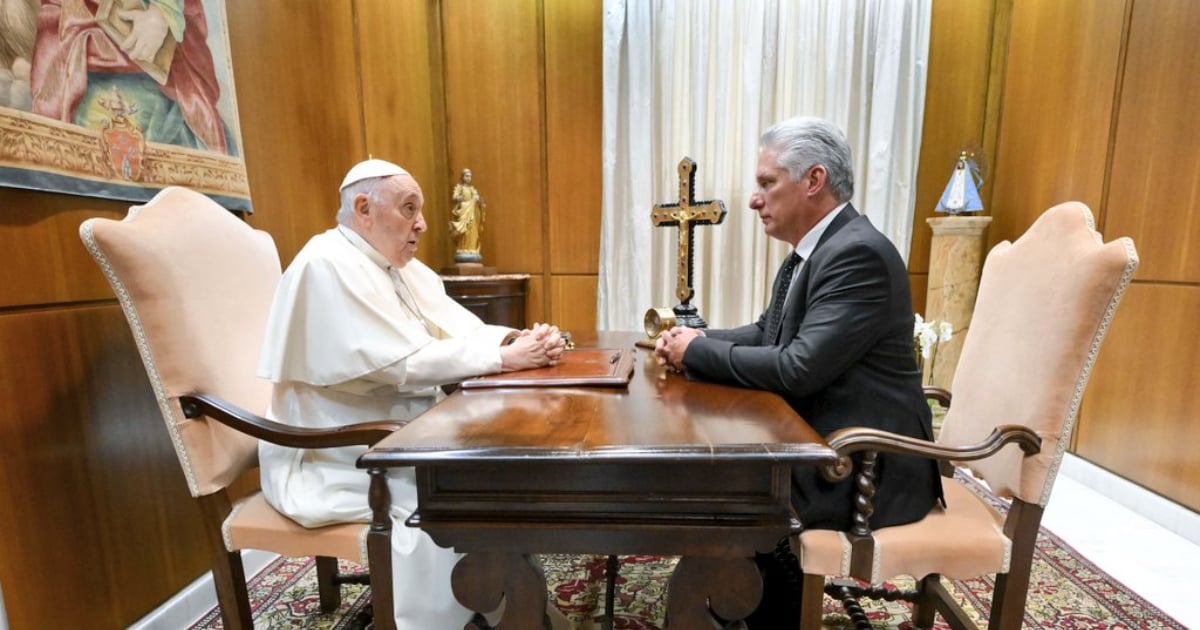
Related videos:
The Cuban regime announced this Tuesday the release of 553 sanctioned individuals, as part of an agreement reached following negotiations with the United States and the mediation of the Vatican.
According to the official statement signed by the Ministry of Foreign Affairs (Minrex), the decision comes in the context of the Ordinary Jubilee of 2025 declared by Pope Francis and, according to the island's government, reflects the "humane and just" nature of its justice system.
Without mentioning the agreement with the administration of President of the United States, Joe Biden, who announced the removal of the island from the list of state sponsors of terrorism and the suspension of Title III of the Helms-Burton Act, the Minrex emphasized that the release is part of the "close and fluid relations" between the Cuban state and the Vatican.
According to the document, President Miguel Díaz-Canel personally informed the Supreme Pontiff about this process in a letter sent in January, expressing the intention to grant freedom to those sanctioned as a symbolic gesture in the spirit of the Jubilee.
The statement also emphasizes that between the years 2023 and 2024, more than 10,000 inmates were released in Cuba under various legal modalities, highlighting that these practices are "common in the Cuban justice system" and are part of the humanitarian tradition of the Revolution.
The relationship between Cuba and the Vatican has been described as "respectful and constructive," and the regime attributes an important role to Pope Francis in facilitating decisions such as the release of these 553 prisoners, who will begin to receive their benefits gradually.
In the background of this measure, the statement mentions the prior conversations between Díaz-Canel and Pope Francis in June 2023, as well as the meeting of Cuban Foreign Minister Bruno Rodríguez Parrilla with representatives of the Holy See in 2022.
During these meetings, in addition to addressing topics of mutual interest, the negative effects of the United States' policy towards the island were discussed, highlighting the role of the Vatican as a mediator.
However, opponents of the regime and human rights organizations have expressed skepticism about the transparency of this process, demanding clarity regarding the criteria used for selecting the beneficiaries and the conditions under which their release will take place.
The release of the 553 inmates occurs in a context marked by internal tensions on the island and international criticism of the Cuban prison system, placing the regime's human rights policies at the forefront of the debate.
Biden lifts sanctions on the Cuban regime in exchange for the release of political prisoners
The administration of United States President Joe Biden, announced this Tuesday that it was removing Cuba from the list of state sponsors of terrorism and suspending Title III of the Helms-Burton Act, following mediation by the Catholic Church, in an agreement that includes the release of a "significant number of political prisoners" on the island.
According to Martí Noticias, a senior U.S. official stated that this was a unilateral decision that involved a promise from the Havana regime to the Catholic Church to release political prisoners.
Frequently Asked Questions about the Release of Prisoners in Cuba and International Relations
How many prisoners will be released by the Cuban regime?
The Cuban regime announced the release of 553 sanctioned individuals following negotiations with the United States and mediation from the Vatican. This release is part of the Ordinary Jubilee of 2025 declared by Pope Francis.
What role has the Vatican played in the release of prisoners in Cuba?
The Vatican has been a key mediator in the negotiations that led to the release of prisoners in Cuba. Pope Francis has facilitated the decisions of the Cuban regime to release these individuals, in a symbolic gesture in the spirit of the Jubilee.
How has the United States influenced the release of Cuban prisoners?
The United States has reached an agreement with the Cuban regime for the release of political prisoners on the island. The Biden administration removed Cuba from the list of state sponsors of terrorism as part of the agreement, facilitated by mediation from the Catholic Church.
What criticisms exist regarding the process of prisoner release in Cuba?
Opponents of the regime and human rights organizations have expressed skepticism about the transparency of the release process. They demand clarity regarding the criteria used to select the beneficiaries and the conditions under which their release will take place.
Filed under: